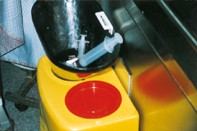Peer Reviewed
Feature Article Infectious diseases
Is your practice an infection hazard?
Abstract
General practitioners can minimise the risk of iatrogenic infection by: adopting ‘Standard Precautions’ (appropriate hand washing, use of gloves, safe use of sharps, and appropriate waste disposal); ensuring that instruments are single use or appropriately sterilised or disinfected; and developing a written infection control policy for the practice.
Key Points
- Proper hand washing is the single most important infection control measure.
- Office practices should have a system of triage so that patients presenting with likely airborne infections are either seen first or segregated from other waiting patients.
- Blood and body fluids from all patients should be regarded as potentially infectious.
- Sharp articles are the most important source of occupational exposure to bloodborne viruses. Needles should not be recapped, and all sharp articles must be discarded immediately into an Australian Standard-specified sharps container.
- If an instrument cannot be adequately cleaned, it cannot be sterilised or adequately disinfected.
- Every general practice must have a written infection control policy.
Purchase the PDF version of this article
Already a subscriber? Login here.

